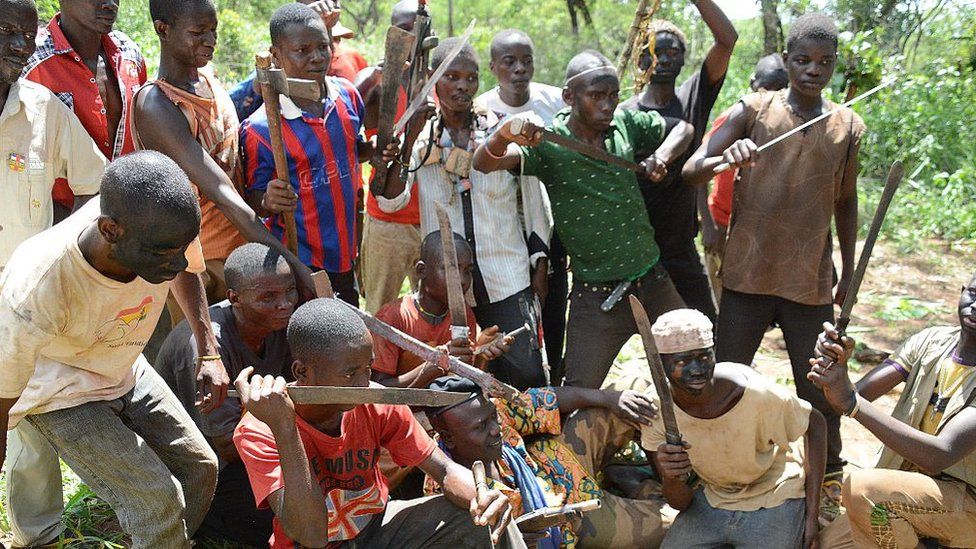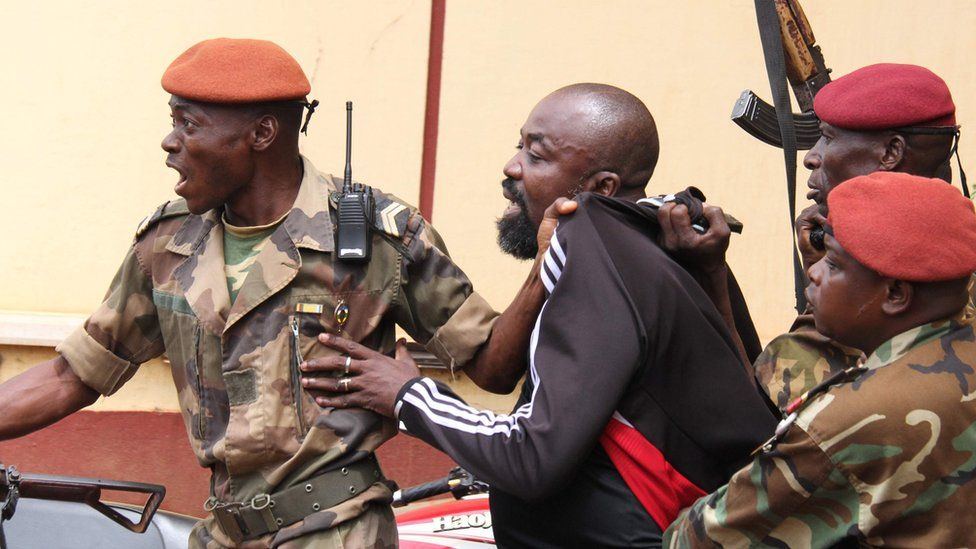
[ad_1]
Patrice Edouard Ngaissona describes himself as the political coordinator of the anti-Balaka
The former head of the Central African Republic (CAR) football federation will be tried for war crimes before the International Criminal Court.
Patrice-Edouard Ngaïssona, who led a predominantly Christian anti-Balaka group, also faces charges of crimes against humanity, which he denies.
He and Alfred Yekatom are accused of coordinating attacks against the country’s Muslim population in 2013-14.
Violence continues to rage in CAR, two-thirds of which is in rebel hands.
The former French colony was plunged into turmoil in 2013 when predominantly Muslim rebels from the Seleka group seized power in the predominantly Christian country.
A group of predominantly Christian militias, called the anti-Balaka, rose up to counter the Seleka after the ouster of President François Bozizé.
Thousands of people have been killed in subsequent clashes and the United Nations (UN) says more than a million people have been forced to flee their homes.
Who is Patrice-Edouard Ngaïssona?
He was the self-proclaimed political coordinator of the anti-Balaka forces.
In this role, says the ICC, he committed war crimes and crimes against humanity, including murder, torture and the recruitment of child soldiers.
Mr. Ngaïssona was barred from running for president of the CAR in 2015 due to his alleged role in the atrocities, which he denies.

He is a former head of the CAR football federation and briefly served as Minister of Sports before being elected to the African Football Confederation (Caf) in February 2018.
His appointment has been criticized by several human rights groups.
“If the allegations were true, I would not be here today,” he then told AFP news agency.
“[I don’t] mix politics and sport – everything I have done has been for the good of my country, ”he added.
French authorities arrested him in December 2018 and transferred him to the ICC in January 2019.
Who is Alfred Yekatom?
Nicknamed Rambo, the ICC alleges that Yekatom is responsible for the murder, torture, attacks on civilians and the use of child combatants as a former militia leader of the anti-Balaka group.
He denies the allegations.
Mr. Yekatom was elected MP in 2016, despite UN sanctions.

He was arrested in October 2018 after firing a gun in parliament, then fled, after an argument with a fellow MP.
His extradition to the ICC was the first since the CAR.
The International Federation of Human Rights (known by its French acronym FIDH) said it had signaled that the authorities were engaged in the fight against impunity.
What is happening in CAR now?
Violence continues to beset CAR despite the arrest of the two former militia leaders. Https://emp.bbc.com/emp/SMPj/2.39.18/iframe.htmlmedia caption
Former President Bozizé, who returned from exile in 2019, is accused of being the source of the latest crisis in this mineral-rich country after the Constitutional Court prevented him from standing in the December elections.
A coalition of rebels – reportedly allied with it – seized large swathes of the country and threatened to enter the capital Bangui.
Mr. Bozizé denied having any links with the fighters, who refused to accept that President Faustin-Archange Touadéra won an election they boycotted. They want a replay.
At least 12,000 UN peacekeepers backed by Rwandan, Russian and French troops are supporting government forces, but their presence has not stopped thousands of civilians from fleeing the country.
The United Nations refugee agency (UNHCR) said in January that around 92,000 refugees had fled to the Democratic Republic of the Congo and more than 13,000 had crossed into Cameroon, Chad and Congo-Brazzaville. He said the others had been moved to CAR.

The conflict in the Central African Republic

- In 2013, Muslim militias called Seleka seized power
- Mainly Christian fighters known as anti-Balaka have taken up arms to fight back
- Over a million people have since been displaced by continued fighting and thousands of deaths
- About 13,000 United Nations peacekeepers are deployed to the country at a cost of nearly $ 900 million (£ 686 million) per year as part of the mission known as Minusca.
Source link